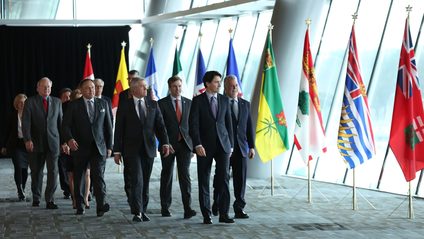
Today’s First Ministers’ meeting in Vancouver is a make-or-break opportunity for Prime Minister Justin Trudeau and 13 provincial/territorial premiers to put some substance behind the conversations we’ve been hearing about ambitious, far-reaching climate solutions.
It’s an opportunity because all the elements are in place for a solid outcome, if only First Ministers agree to go the next step.
Provinces representing the overwhelming majority of Canada’s population are already on the road to the coal phaseouts and carbon pricing programs we need. And senior federal spokespeople have repeatedly stressed that energy development (in this case, they mean fossil fuel or pipeline projects) can only go ahead within a robust climate plan.
It’s a make-or-break moment because none of the rhetoric or programs we’ve seen to date go far enough, fast enough to match the commitment to a 1.5°C limit on average global warming that Canada helped broker at the 2015 UN climate summit in Paris. Not nearly.
That won’t change today, not in a single day of high-stakes negotiations. But if the Vancouver meeting succeeds, it will be because First Ministers agreed to get moving on a comprehensive toolkit of climate solutions, from energy efficiency in our buildings, vehicles, and equipment, to public transit, smart grids, electric vehicle development, and a quick end to fossil fuel subsidies.
What First Ministers Should Agree On
Media coverage so far has focused on the areas where premiers diverge, with Saskatchewan’s Brad Wall, in particular, speaking out against a federal or provincial carbon price.
But in his opening address to the GLOBE clean technology conference yesterday morning, the Prime Minister said politicians of all stripes want a strong economy and a healthy environment.
Provincial premiers “have led the push to phase out coal power in Ontario and Alberta and put a price on carbon in Quebec and here in British Columbia,” he told participants. “These are politicians of different stripes and different beliefs. But they come together on this issue.”
Except when they don’t. Weeks before the First Ministers’ meeting, Wall was already staking out his position against Canada-wide carbon pricing. "This is not right for Saskatchewan, and may I say, I don't think it's right for the country right now," he told CBC. "The last thing we need right now is a tax increase or a new federal carbon tax or, frankly, a provincial carbon levy. Now's not the right time for any of those things."
Which means the premiers will succeed to the extent that they can come together on two key points that Canada’s climate and energy community has been hammering away at in the lead-up to the Vancouver meeting: The urgency of climate change, and the powerful potential to build a prosperous, 21st-century economy by translating climate action into jobs.
A Sense of Urgency
On the immediate need for far-reaching climate action, the numbers tell the story.
2015 was the warmest year in recorded history, according to the U.S. National Aeronautics and Space Administration (NASA). 2014 was the second-warmest.
From Arctic ice loss to ocean acidification, from coastal flooding to crippling droughts, climate impacts aren’t just showing up around the world. The impacts are getting more serious, and the pace of change is accelerating. The Paris agreement was a first step toward solutions that work—but only if every country, including Canada, does its part.
But Canada is far behind in its efforts to implement its paltry Paris target, a 30% reduction in carbon pollution by 2030. Environment and Climate Change Minister Catherine McKenna has declared that target a floor, not a ceiling. But first, First Ministers will have to close the gap between the target and their climate action to date.
A Million Climate Jobs
Even more important than recognizing the urgency of climate action, it’s time for First Ministers to look at climate solutions as a matter of opportunity and gain, not loss and pain.
Clean energy already created more direct jobs in Canada than the tar sands/oil sands in 2014, before the oil price crash began producing massive layoffs. And at the Paris conference, the Canadian Labour Congress and Climate Action Network Canada co-hosted a workshop that pointed to the million person-years of climate employment the country could create over the next five years.
The answers are out there, and several of the First Ministers already know it. Now it’s time for all 13 federal and provincial jurisdictions to agree to a bold, practical plan of action.
Look no farther than Wall’s and Alberta Premier Rachel Notley’s deep concern about job loss in the fossil fuel sector for proof that the plan will only work if it provides for a just job transition for people caught on the wrong side of an historic energy transformation. If we really mean it that a low-carbon future must leave no one behind—and we’d better—we have to be as concerned about oil patch workers in Fort McMurray as we are about small island states and climate refugees.
Prime Minister Trudeau is right that none of this should be controversial. These are all issues on which the vast majority of Canadians should be able to find common ground. But time is short. Let’s see what the First Ministers can get done today.
Sincerely,
Diane Beckett
Interim Executive Director
Sierra Club Canada Foundation
One Earth • One Chance
Like us on Facebook.
Find us on Twitter @sierraclubcan.
SCCF's success depends on the support of like-minded individuals and organizations.
